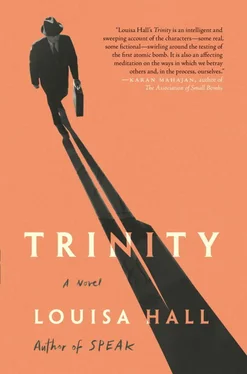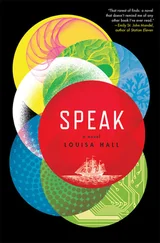Then I remembered a photograph I’d seen as a child, of several Japanese women searching the rubble in the days after the bomb was dropped on Hiroshima. Their faces had been bandaged, to keep the skin from falling away, and their eyes were gaps in the fabric.
It was frightening to me when I first saw that photograph: those gaps they had for eyes. I found it unacceptable not to be able to read their expressions, to know what they might be thinking, or feeling, wandering through the ruin of their former city.
Up until that explosion, they’d lived in apartments and houses, with plants they’d watered, books they’d read, windows they’d stood beside and looked out from onto the treetops. But when that bomb was dropped, the city wasn’t only partially damaged. The entire reality of the place was destroyed in the course of a day, first by the explosion, then by the firestorm that raged through the city, and, as a child, having never experienced such total destruction, I had no way of knowing what those women with no eyes could have been thinking while they searched through what remained of the rubble.
And now Oppenheimer was sitting in his bare office, compelling me to notice his eyes, which, like my husband’s, seemed to tell a whole story, but perhaps did just the reverse.
Because what, I thought, did I really know about Oppenheimer, who made those bombs in secret though he believed in transparency and had been a pacifist at one point? And what, for that matter, did I know about my husband?
And meanwhile, across from me, Oppenheimer hadn’t stopped speaking. He was talking about how, for all intents and purposes, an individual unit only exists at the moment it collides with and absorbs some other unit. It only exists, he was saying, when it’s becoming something new.
His words issued from him as smoothly as breath, as if to survive he had to keep talking, as a fish can only breathe when it’s swimming. He was only safe, I thought, as long as he was still uttering words.
Then I interrupted him. Why, I asked, had he felt compelled to lie about going back to visit Jean Tatlock?
In an instant, his expression became wary. Behind his paused face, he crouched very still, waiting for the blow of my next question.
And why, I said, warming to the brutality of my approach, did you also lie about informing on Bernard Peters?
How many lies did you tell, I asked, while you were advocating transparency about nuclear secrets?
By then he’d turned away from me.
He was looking out the window again, and it was a long time before he turned back. It seemed to me then that the sun dropped while I waited. It seemed that we both grew several years older.
Outside the window, the trees had changed in the waning light. Their bare branches were no longer gray. Now they were burnished and almost soft, as if covered by a rust-colored velvet. As the light drained from the sky, the reddish hue of their branches intensified to the point that when Oppenheimer finally decided to speak, they almost seemed to be burning.
“To tell the whole story,” he said, fixing me with those eyes that reminded me so much of my husband’s, “you’d have to go back to the beginning.”
“Go, then,” I said.
“But of course,” he said, “you can’t ever go back to the very beginning. And how, then, do you ever tell the whole story?”
WHEN I FIRST INTERVIEWED MY HUSBAND, OR THE STRANGER HE WASto me at that point, I had no intention of getting involved. I was twenty-eight, which at that time was old for a woman not to be married. But then I’d already been divorced. It seemed to me that the choice was between marriage and work. I’d chosen work, which, for me, was choosing survival. And I’d never regretted that choice. By the time of that first interview with my husband, I was rising rapidly in the ranks of the magazine where I was a staff writer.
When I met my husband, therefore, I had no intention of risking my position. I only wanted to complete the profile I’d been assigned.
That, however, proved to be an unusually challenging task. From the beginning, I felt that the personality my subject had constructed—and was trying to force me to describe in my profile—was obviously false.
It struck me as silly. It seemed to be a childish costume, some Davy Crockett routine he’d carried over into adulthood.
I’m not sure I need to go into detail. I don’t want to depict him as absurd. But by way of example, though it was 1963 and he was born in Manhattan—and, with the exception of a brief stint at Oak Ridge, had lived in the city for most of his life—he wore cowboy boots and a big belt with an enormous, engraved silver buckle. The sculptures that had brought him renown were reminiscent of American Indian totems, and his apartment was full of bear heads and flint weapons.
Now that’s enough. I don’t want to mock him. I only mean to suggest that my husband—or the stranger he was to me at the time—seemed to have employed more contrivance than most in his manner of self-presentation, and I felt that it should be my task as a writer to work my way past the imposture and understand him in a subtler fashion.
He, however, was skilled at avoiding my strategies for eliciting authentic responses. If he couldn’t answer a query with one of his practiced anecdotes about living in the Tennessee wilds, he was capable of simply not hearing the question.
Alternatively, he’d simply go blank. He’d look off into the distance, blinking blindly and scratching the side of his nose with one finger.
Other times, after I asked a question he wasn’t expecting, he’d tilt his head at me and smile, as if I’d said something endearing and he’d been distracted by the desire to lean forward and kiss me.
IN MY DESIRE TO AVOID THAT POSSIBILITY, I HAD TO BE STRATEGICabout meeting him in public places, where I’d have an easy excuse for not wanting to kiss him. But his own strategies conflicted with mine, and we often engaged in complicated negotiations over the locations of our interviews.
He’d suggest his apartment in the Village, and I’d suggest a restaurant down the street from my office in midtown. Then he’d counter with the bar underneath his apartment, a place with sawdust on the floor and big barrels of peanuts.
When we met there, and drank pints of beer in a banquette toward the back, he often grabbed for my hand on the table.
SOMETIMES, IF I CLOSE MY EYES, I CAN STILL SMELL THE SAWDUST, WETwith spilled beer. I can taste the salt of the peanuts on my dry lips.
I know that I’m not, but when I remember that taste, it almost seems as if I’m still the same woman who sat there with him and tried to remove my hand from his grasp, without allowing him to suspect how much I disliked him.
Over time, as you can imagine, these complicated strategies for avoiding his advances became somewhat draining, and meanwhile none of my questions seemed to scratch the surface of his outsized personality.
Our interviews were frustrating. I felt I was failing. Afterward, on warm evenings, I’d walk home to my own apartment on the other side of Washington Square Park, watching, as I often did in those days, the lights coming on in people’s apartments. And though that experience usually brought me a reliable pleasure, a kind of warmth at a remove, on such evenings I walked with the nagging sensation that I still knew nothing about him.
I wasn’t even sure where he’d grown up. Though he’d lived most of his life in Manhattan, there were several years in his childhood that he didn’t ever account for, and I didn’t know if they’d been spent in some western state.
I didn’t know, in other words, whether his western routine was a souvenir of those lost years in his youth, or whether, spontaneously, as an adult, he’d started to affect that routine precisely because it had nothing to do with a youth he hoped to forget.
Читать дальше












